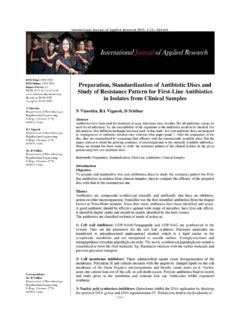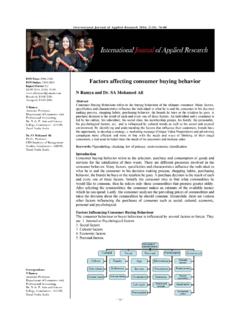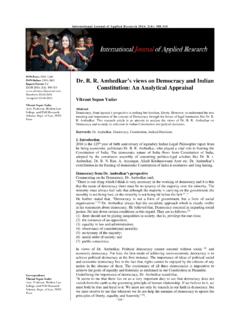Transcription of ISSN Print: Advantages and disadvantages of corporate ...
1 ~ 372 ~ ISSN Print: 2394-7500 ISSN Online: 2394-5869 Impact Factor: IJAR 2017; 3(3): 372-374 Received: 22-01-2017 Accepted: 23-02-2017 S Geethamani Department of corporate Secretaryship, PSG College of Arts and Science, Coimbatore, Tamil Nadu, India Correspondence S Geethamani Department of corporate Secretaryship, PSG College of Arts and Science, Coimbatore, Tamil Nadu, India Advantages and disadvantages of corporate social responsibility S Geethamani Abstract Movement aimed at encouraging companies to be more aware of the impact of their business on the rest of society, including their own stakeholders and the environment. corporate social responsibility (CSR) is a business approach that contributes to sustainable development by delivering economic, social and environmental benefits for all stakeholders. Keywords: corporate social responsibilities, important, resistance, Advantages , disadvantages Introduction corporate social responsibility (CSR, also called corporate conscience, corporate citizenship or responsible business) CSR policy functions as a self-regulatory mechanism whereby a business monitors and ensures its active compliance with the spirit of the law, ethical standards and national norms.
2 With some models, a firm's implementation of CSR goes beyond compliance and engages in "actions that appear to further some social good, beyond the interests of the firm and that which is required by law . The aim is to increase long-term profits through positive public relations, high ethical standards to reduce business and legal risk, and shareholder trust by taking responsibility for corporate actions. CSR strategies encourage the company to make a positive impact on the environment and stakeholders including consumers, employees, investors, communities, and others. CSR is a concept with many definitions and practices. The way it is understood and implemented differs greatly for each company and country. Moreover, CSR is a very broad concept that addresses many and various topics such as human rights, corporate governance, health and safety, environmental effects, working conditions and contribution to economic development.
3 The purpose of CSR is to drive change towards sustainability. Although some companies may achieve remarkable efforts with unique CSR initiatives, it is difficult to be on the forefront on all aspects of CSR. Definition The term " corporate social responsibility" became popular in the 1960s and has remained a term used indiscriminately by many to cover legal and moral responsibility more narrowly construed. Business Dictionary defines CSR as "A company s sense of responsibility towards the community and environment (both ecological and social) in which it operates. Companies express this citizenship through their waste and pollution reduction processes, by contributing educational and social programs and by earning adequate returns on the employed resources." Scope Initially, CSR emphasized the official behaviour of individual firms. Later, it expanded to include supplier behaviour and the uses to which products were put and how they were disposed of after they used.
4 Important corporate social responsibility (CSR) has become one of the standard business practices of our time. International Journal of Applied Research 2017; 3(3): 372-374 ~ 373 ~ International Journal of Applied Research For companies committed to CSR it means kudos and an enhanced overall reputation a powerful statement of what they stand for in an often cynical business world. The establishment of a CSR strategy (sometimes referred to as a sustainability strategy) is a crucial component of a company s competiveness and something that should be led by the firm itself. This means having policies and procedures in place which integrate social, environmental, ethical, human rights or consumer concerns into business operations and core strategy all in close collaboration with stakeholders. For companies, the overall aim is to achieve a positive impact on society as a whole while maximising the creation of shared value for the owners of the business, its employees, shareholders and stakeholders.
5 Not so long ago, the European Commission defined CSR as the responsibility of enterprises for their impacts on society , a succinct and distinct summation for sure. Organisations that had a genuine commitment to CSR substantially outperformed those that did not, with an average return on assets 19 times higher. Additionally, the study showed that CSR-orientated companies had a higher level of employee engagement and provided a markedly better standard of customer service. Establishing a CSR programme The factors driving companies to pursue a CSR agenda are fairly consistent across the corporate world; however, once a company makes the decision to adopt CSR orientated activities, a plan (involving a lot of engagement with employees, managers, suppliers, NGOs and others) must be implemented to carry out the agreed CSR programme.
6 Within the pages of its CSR Implementation Guide the International Institute for Sustainable Development (IISD) outlines what it considers to be the six key components which go towards a coherent CSR plan: (i) CSR Assessment; (ii) CSR Strategy; (iii) CSR Commitments; (iv) Implementation Plan and Actions; (v) Verification and Evaluation of Results, and (vi) Refinement. Perhaps most important, however, is an underlying commitment to multi-stakeholder engagement as a foundational pillar to any credible CSR program, says Jason Potts, a senior associate with IISD s sustainable markets and responsible trade initiative. CSR is fundamentally about ensuring that companies forward broader public objectives as an integral part of their daily activities and this can only be ensured with the appropriate communication channels with stakeholders.
7 CSR policies need to be considered as a core and inseparable component of the overall service or product offering. CSR resistance Companies often develop a CSR agenda not because of an altruistic desire to assist in curing the ills of society, but for reasons more akin to a box ticking exercise. Whatever the consensus, some organisations either implement their CSR programme with a distinct lack of heart or resist adopting a CSR policy altogether. If a resistance to CSR policies does exist, it usually stems from the notion of allowing external stakeholders to directly influence corporate policies and strategies, an idea that is largely antithetical to the basic mind set under which many, if not most, corporations operate. An honest adoption of CSR often requires a serious reformulation of corporate purpose and decision-making structures, Such change also implies, and rests upon, the adoption of a corporate culture which actively encourages employees to consider how the company might be able to do better in the world.
8 When CSR policies are adopted without simultaneous tools for stimulating and allowing deep change, one can expect similarly soft results in terms of CSR outcomes and impacts. Avoiding ethical blowback Many companies are shackled by an adherence to a 20th century mind set imbued by the Milton Friedman paradigm of only shareholder returns count . Instead, companies should be looking at business strategy through the lens of sustainable supply or resilience a very different proposition from the Friedman philosophy. Tesco suffered hugely because all their suppliers hated them, and so did everyone else, this was because they squeezed everyone and it backfired on them in the end. The Wharton Business School professor Thomas Donaldson calls this type of scenario the ethical blowback . Sustainability is clearly important.
9 More businesses are adopting a strategic approach to their CSR policies because they are increasingly seeing the benefit across their business and for their stakeholders. Many businesses have made significant strategic advances in sustainability, CSR allows businesses to demonstrate their values, engage their employees and communicate with the public about how they operate and the choices they make, to ensure a sustainable future. CSR helps pave the way for partnerships between businesses and civil society that are based on common goals and shared actions to deliver impact-driven outcomes. Future embrace At present, the incorporation of CSR programmes by businesses on a fundamental level appears as prevalent as ever. However, the jury is still very much out as to whether companies have it within them to embrace a broad or multifaceted vision of CSR. It would be utopic to expect a sea change among industries, While there are plenty of examples of companies using strong CSR performance as a brand-building and product marketing strategy, far too many corporate executives still rely on the old financial and hierarchical models of yesteryear as the basis of their own planning.
10 The biggest and most influential companies also tend to be the most reliant on the conventional way of doing business. What is happening, however, is a broad transition to the adoption of external multi-stakeholder processes in the form of multi-stakeholder sustainability standards and labels as a way of outsourcing the stakeholder engagement process. Ultimately, there are no hard and fast rules governing CSR. The more companies understand the growing resilience, reputation and legal risk they face, the more opportunities our globalised and connected world has to offer them. This often depends on the sector, points out Mr Webb. If you make mining equipment, your focus will be energy efficiency and perhaps new technology that is safer. If you sell chocolate, your concerns are around the economic viability of your supply chain.



















